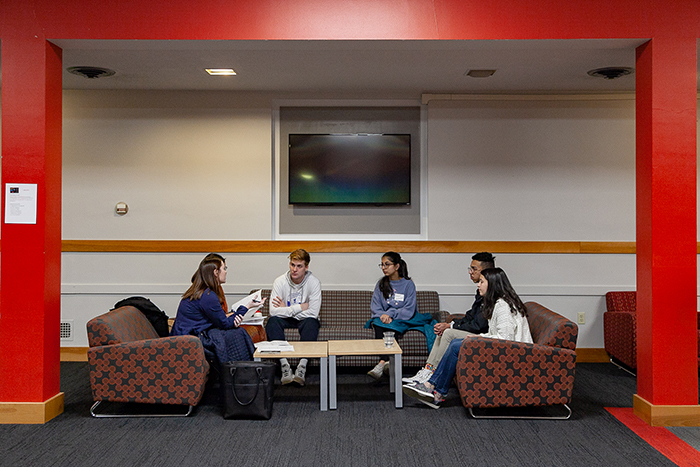Dickinson College Workshop Helps Students Spark Positive Changes Around Diversity, Inclusion

Photo by Carl Socolow '77.
Students share experiences, help shape policy
by MaryAlice Bitts-Jackson
On college campuses and in the wider world, there’s much being said about the need to foster respectful dialogue across social, political, cultural, economic and ethnic boundaries. A recent program on campus not only helped meet that need but then went a step further, offering students a chance to help effect positive change.
That was the premise behind Share and Shape, an event held Oct. 15 and 18 that provided a platform for students to share with and learn from peers in small group discussions. After learning about the college’s diversity & inclusion programs and initiatives, the students were invited to weigh in, offering insights and advice to college leaders as they shape related college policies.
“Sometimes students will attend dialogues, and then they'll say, 'OK. What’s next? How is this going to help?’ So by integrating policy development into the process, students can understand that what they’re saying is actually going to translate into palpable changes in the community,” says Vincent Stephens, director of the Popel Shaw Center for Race & Ethnicity. “We want to make sure we are addressing issues vigilantly and with as many resources as possible.”
Thirty-seven students registered in advance for the program via an online form, indicating the clubs, campus jobs, groups and organizations they’re involved with at Dickinson. At the start of the two-hour session, they divided into small groups, along with peers outside of their main social circles. As they described the times they’ve felt supported and challenged on campus, they also learned how others’ experiences and perspectives differed from and were similar to their own. And after learning about college resources and policies, they discussed the values the Dickinson community should aspire to, and what an appropriate response would look like when a community member diverges from those values.
The sessions were led by small teams of specially trained students as well as faculty and staff members, who encouraged participants to offer suggestions and insights—based on their understanding of college policies and on their own experiences on and off campus—and took notes of key discussion points. The moderators later provided students’ anonymous feedback to Stephens, who will compile the comments and concerns, noting overlaps, similarities and differences, and then pass the data on to the President’s Commission on Inclusivity. The commission will use the information to inform policy decision-making.
“This program has inspired me to speak for justice,” says Titilope Ogunsola ’19 (French & Francophone studies, health studies), a resident advisor who took part in the Share and Shape program and appreciated the chance to practice her sustained-dialogue skills. “We know that our voices are not only being heard, but that there are people noting our remarks and reporting them to the school's administration, so that there can be implementation of new measures to improve Dickinson."
Co-sponsored by the offices of Residence Life and Institutional Effectiveness & Inclusivity, and by the Landis Collective and Student Leadership & Campus Engagement, the event was part of a larger ongoing effort at Dickinson to build a more inclusive community on campus. This includes a new Landis Listens series, through which the four directors of the Landis Collective reach out to specific subsets of the student population and moderate intragroup discussions to gain a sense of areas where more support is needed.
“I think we’re in a good listening moment,” says Stephens, “and I think that that these conversations are going to manifest in things that people can really see and feel and touch.”
TAKE THE NEXT STEP
Published October 22, 2018